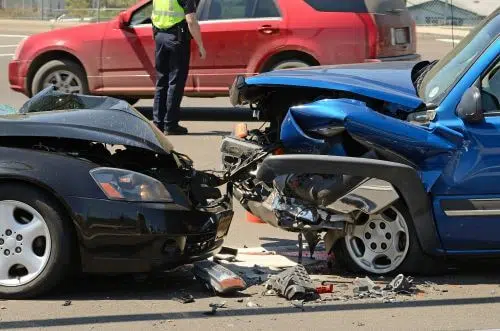
Head-on collisions can be terrifying, as generally, no one expects to head out on the roadway and be struck by another vehicle. However, in North Carolina, accidents happen daily. If you or a loved one have been injured due to a head-on collision, contact the experienced car collision attorneys at Tatum & Atkinson, ‘the Heavy Hitters’, by calling (800) 529-0804 or contacting us online. With over 65 years of collective experience serving North Carolina accident injury victims, Tatum & Atkinson ‘the Heavy Hitters’ has the knowledge and skills required to ensure you receive the just compensation you deserve.
Head-On-Collision
What Is A Head-On Collision?
Head-on collisions occur when another vehicle, whether a car, truck, or motorcycle, comes driving directly towards you and collides with you. A head-on or frontal collision occurs when two vehicles collide with each other and are driving in opposite directions. Alternatively, it is considered a head-on collision when a car strikes an object such as a light pole, fence, tree, or building by driving into it “head-on.” Although you may not see a head-on collision coming right away, you will certainly feel the sudden impact of the collision. If you or a loved one have become the victim of another driver’s negligence, an experienced personal injury attorney can help you to receive the compensation you deserve.
Why Is A Head-On Collision More Dangerous?
Head-on collisions are considered the most deadly of all types of vehicle accidents. While somewhat rare (accounting for only 2% of U.S. crashes annually), head-on collisions account for more than 10% of fatal crashes. Compared to other types of accidents, such as rear-end accidents, injuries associated with head-on collisions are often much more severe. They are often associated with life-threatening or permanent injuries.
Causes Of Head-On Collisions
Head-on collisions may happen for several different reasons. Still, they typically occur when a driver has crossed over the centerline of the roadway or is driving in the wrong direction down a road. Common causes of head-on collisions include:
Distracted Driving
The use of cell phones while driving may lead to head-on collisions. When a driver is not paying attention to the road, it is easy for them to drift over their lane into oncoming traffic if the driver is not paying attention. Alternatively, other forms of distracted driving such as eating, drinking, talking with passengers, and reaching for an object may lead to a head-on collision.
Impaired Driving
Driving under the influence of drugs, alcohol, or prescription medication can severely impair a driver’s reaction time, leading to head-on collisions.
Fatigued Driving
Driving while extremely tired or sleep-deprived can make it easy to drive into oncoming traffic. When closing one eyes momentarily or drifting to sleep by accident, it is easy to veer into oncoming traffic.
Driver Confusion
When driving in a new town or a new space, it can be easy for a driver to become confused when going down an unfamiliar road. Confused drivers may accidentally drive the incorrect way on a one-way street or drive the wrong way going on a ramp or highway entrance. Nighttime blindness may also lead to driving mistakes, leading to a head-on collision.
Improper Passing
Many head-on collisions occur when a driver attempts to pass a slow vehicle by crossing over into the on-coming traffic lane, risking the chance of a head-on collision.
Head-On Collision Injuries
After a head-on collision, it is common for drivers and passengers to receive extreme injuries. Common head-on collision injuries include:
- Broken and fractured bones
- Burns
- Head injuries and concussions
- Internal organ damage
- Lacerations
- Neck and back injuries
- Spinal cord injury
- Traumatic brain injury (TBI)
- Whiplash
Sadly, in a head-on collision, it is not uncommon for accident victims to suffer from fatal injuries. If a severe injury or death was caused by the carelessness of another driver, wrongful death or personal injury lawsuit may be filed against the at-fault driver or their insurer to assist the car accident injury victim and their family from any accident-related losses.
Head On Collision
Who Is At Fault In A Head-On Collision?
If you have been injured in a head-on collision automobile accident, you will likely wonder if you are eligible for compensation. To receive compensation, you must prove that the other driver engaged in unlawful or risky behavior or otherwise failed to uphold their duty of care to operate their vehicle safely and reasonably. Additionally, you will need to prove that the other driver’s actions were the direct cause of your injuries. Finally, to receive compensation, you must prove that the other driver caused you to incur medical expenses, lost wages, pain and suffering, or property damage.
It is essential to understand that as insurance companies are typically for-profit corporations, their end goal will be to make a profit by minimizing the payouts they are liable for. They may do this by offering undervalued settlements, denying liability, or may use tactics to hamper your claim. As a result, insurers have mistreated many car accident victims. Ensure that your rights are protected by hiring an experienced car accident attorney who is knowledgeable regarding North Carolina personal injury law and the rights of a car accident injury victim to receive just compensation.
Head On Collision Lawyer
At Tatum & Atkinson, ‘the Heavy Hitters,’ we have over 65 years of collective experience fighting for car accident injury victims in North Carolina. We know how stressful the aftermath of a car accident can be and pride ourselves in being able to take some of the pressure off of our client’s back and allowing them to rest and recuperate while they can rest assured that we will fight tirelessly until we receive the best possible outcome for your case. Call (800) 529-0804 or contact us online today to receive your free, no-obligation case evaluation. If we take your case, you will pay no attorney’s fees out-of-pocket, and we will only get paid if we win your case.
